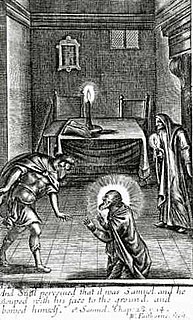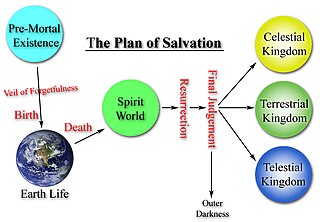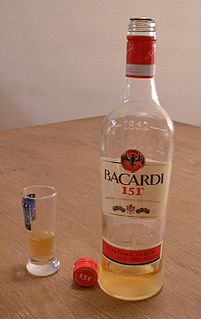Related Research Articles

A ghost is the soul or spirit of a dead person or animal that can appear to the living. In ghostlore, descriptions of ghosts vary widely from an invisible presence to translucent or barely visible wispy shapes, to realistic, lifelike forms. The deliberate attempt to contact the spirit of a deceased person is known as necromancy, or in spiritism as a séance. Other terms associated with it are apparition, haunt, phantom, poltergeist, shade, specter or spectre, spirit, spook, wraith, demon, and ghoul.

A liqueur is an alcoholic drink composed of spirits and additional flavorings such as sugar, fruits, herbs, and spices. Often served with or after dessert, they are typically heavily sweetened and un-aged beyond a resting period during production, when necessary, for their flavors to mingle.

Spirit possession is an unusual or altered state of consciousness and associated behaviors purportedly caused by the control of a human body by spirits, ghosts, demons, or gods. The concept of spirit possession exists in many cultures and religions, including Buddhism, Christianity, Haitian Vodou, Hinduism, Islam, Wicca, and Southeast Asian, African, and Native American traditions. Depending on the cultural context in which it is found, possession may be considered voluntary or involuntary and may be considered to have beneficial or detrimental effects on the host.

Necromancy is the practice of magic or black magic involving communication with the dead – either by summoning their spirits as apparitions, visions or raising them bodily – for the purpose of divination, imparting the means to foretell future events, discover hidden knowledge, to bring someone back from the dead, or to use the dead as a weapon. Sometimes referred to as "Death Magic", the term may also sometimes be used in a more general sense to refer to black magic or witchcraft.

In Latter Day Saints theology, the term spirit world refers to the realm where the spirits of the dead await the resurrection. In LDS thought, this spirit world is divided into at least two conditions: Paradise and spirit prison:

Alcohol proof is a measure of the content of ethanol (alcohol) in an alcoholic beverage. The term was originally used in England and was equal to about 1.8 times the percentage of alcohol by volume (ABV). The UK now uses ABV instead of proof. In the United States, alcohol proof is defined as twice the percentage of ABV. The definition of proof in terms of ABV varies from country to country.

Spiritualism is a social religious movement according to which the laws of nature and of God include "the continuity of personality after the transition of death" and "the possibility of communication between those living on Earth and those who have made the transition". The afterlife, or the "spirit world", is seen by spiritualists, not as a static place, but as one in which spirits continue to evolve. These two beliefs—that contact with spirits is possible, and that spirits are more advanced than humans—lead spiritualists to a third belief: that spirits are capable of providing useful knowledge about moral and ethical issues, as well as about the nature of God. Some spiritualists will speak of a concept which they refer to as "spirit guides"—specific spirits, often contacted, who are relied upon for spiritual guidance. Emanuel Swedenborg has some claim to be the father of Spiritualism. Spiritism, a branch of spiritualism developed by Allan Kardec and today practiced mostly in Continental Europe and Latin America, especially in Brazil, emphasizes reincarnation.

A séance or seance is an attempt to communicate with spirits. The word séance comes from the French word for "session", from the Old French seoir, "to sit". In French, the word's meaning is quite general: one may, for example, speak of "une séance de cinéma". In English, however, the word came to be used specifically for a meeting of people who are gathered to receive messages from ghosts or to listen to a spirit medium discourse with or relay messages from spirits. In modern English usage, participants need not be seated while engaged in a séance.
Spirit or spirits may refer to:
Evocation 1. is the act of evoking ; 2. act of calling upon or summoning a spirit, demon, deity or other supernatural agents, in the Western mystery tradition. Comparable practices exist in many religions and magical traditions and may employ the use of mind-altering substances with and without uttered word formulas.

White spirit or mineral spirits, also known as mineral turpentine (AU/NZ), turpentine substitute, and petroleum spirits, is a petroleum-derived clear liquid used as a common organic solvent in painting. There are also terms for specific kinds of mineral spirits, including Stoddard solvent and solvent naphtha (petroleum). Mineral spirits are often used as a paint thinner, or as a component thereof, though paint thinner is a broader category of solvent. Odorless mineral spirits (OMS) have been refined to remove the more toxic aromatic compounds, and are recommended for applications such as oil painting.

Liquor is an alcoholic drink produced by distillation of grains, fruits, vegetables, or sugar, that have already gone through alcoholic fermentation. Other terms for liquor include: spirit drink, distilled beverage or hard liquor. The distillation process concentrates the liquid to increase its alcohol by volume. As liquors contain significantly more alcohol (ethanol) than other alcoholic drinks, they are considered "harder" – in North America, the term hard liquor is sometimes used to distinguish distilled alcoholic drinks from non-distilled ones, whereas the term spirits is used in the UK. Examples of liquors include brandy, vodka, absinthe, gin, rum, tequila, and whisky.

Aqua vitae or aqua vita is an archaic name for a concentrated aqueous solution of ethanol. These terms could also be applied to weak ethanol without rectification. Usage was widespread during the Middle Ages and the Renaissance, although its origin is likely much earlier. This Latin term appears in a wide array of dialectical forms throughout all lands and people conquered by ancient Rome. Generally, the term is a generic name for all types of distillates, and eventually came to refer specifically to distillates of alcoholic beverages (liquors).
Rectified spirit, also known as neutral spirits, rectified alcohol or ethyl alcohol of agricultural origin, is highly concentrated ethanol that has been purified by means of repeated distillation in a process called rectification. In some countries, denatured alcohol or denatured rectified spirit may commonly be available as "rectified spirit", as in some countries the retail of rectified alcohol in its non-denatured form is prohibited.
Shen (神) is the Chinese word for "deity", "spirit", heart, inclusive and community mind, or future mind. The Japanese equivalent is shin. This single Chinese term expresses a range of similar, yet differing, meanings. The first meaning may refer to spirits or gods that are intimately involved in the affairs of the world. Spirits generate entities like rivers, mountains, thunder and stars. A second meaning of shen refers to the human spirit or psyche; it is the basic power or agency within humans that accounts for life, and in order to further life to its fullest potential the spirit is transformed to actualise potential. A third understanding of shen describes an entity as spiritual in the sense of inspiring awe or wonder because it combines categories usually kept separate, or it cannot be comprehended through normal concepts. In traditional Chinese medicine the physician will describe this as the shimmer or gloss that is seen above the surface of a object. If it has a glow, vitality and luster it has good Shen.
Fruit spirit is a distilled beverage produced from mash, juice, wine or residues of edible fruits. The term covers a broad class of spirits produced across the world, and typically excludes beverages made from grapes, which are referred to as plain brandy or pomace brandy. Apples, pears, apricots, plums and cherries are the most commonly used fruits.
Spiritualism is a metaphysical belief that the world is made up of at least two fundamental substances, matter and spirit. This very broad metaphysical distinction is further developed into many and various forms by the inclusion of details about what spiritual entities exist such as a soul, the afterlife, spirits of the dead, deities and mediums; as well as details about the nature of the relationship between spirit and matter. It may also refer to the philosophy, doctrine, or religion pertaining to a spiritual aspect of existence.

An alcoholic drink is a drink that contains ethanol, a type of alcohol that acts as a drug and is produced by fermentation of grains, fruits, or other sources of sugar. The consumption of alcoholic drinks, often referred to as "drinking", plays an important social role in many cultures. Most countries have laws regulating the production, sale, and consumption of alcoholic beverages. Regulations may require the labeling of the percentage alcohol content and the use of a warning label. Some countries ban such activities entirely, but alcoholic drinks are legal in most parts of the world. The global alcoholic drink industry exceeded $1 trillion in 2018.
Mun or Munism is the traditional polytheistic, animist, shamanistic and syncretic religion of the Lepcha people. It predates the 7th century Lepcha conversion to Lamaistic Buddhism, and since that time, the Lepcha have practiced it together with Buddhism. Since the arrival of Christian missionaries in the nineteenth century, Mun traditions have been followed alongside that religion as well. The traditional religion permits incorporation of Buddha and Jesus Christ as deities, depending on household beliefs.

Anito, also spelled anitu, refers to ancestor spirits, nature spirits, and deities in the indigenous Philippine folk religions from the precolonial age to the present, although the term itself may have other meanings and associations depending on the Filipino ethnic group. It can also refer to carved humanoid figures, the taotao, made of wood, stone, or ivory, that represent these spirits. Anito is also sometimes known as diwata in certain ethnic groups.
References
 This article incorporates text from a publication now in the public domain : Chambers, Ephraim, ed. (1728). "Ardent spirit". Cyclopædia, or an Universal Dictionary of Arts and Sciences (1st ed.). James and John Knapton, et al.
This article incorporates text from a publication now in the public domain : Chambers, Ephraim, ed. (1728). "Ardent spirit". Cyclopædia, or an Universal Dictionary of Arts and Sciences (1st ed.). James and John Knapton, et al. - "Ardent spirit". The Incompleat Chymist. Archived from the original on 2005-12-22. Retrieved 2006-01-22.